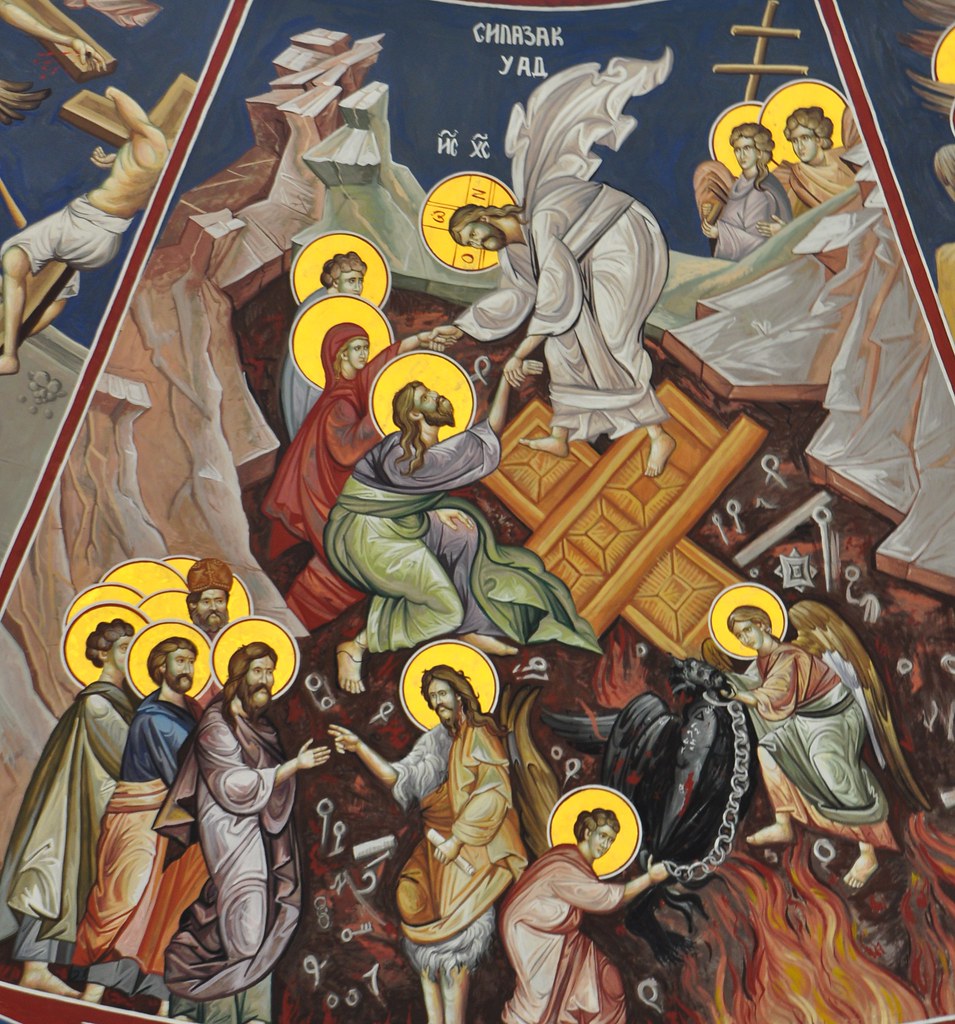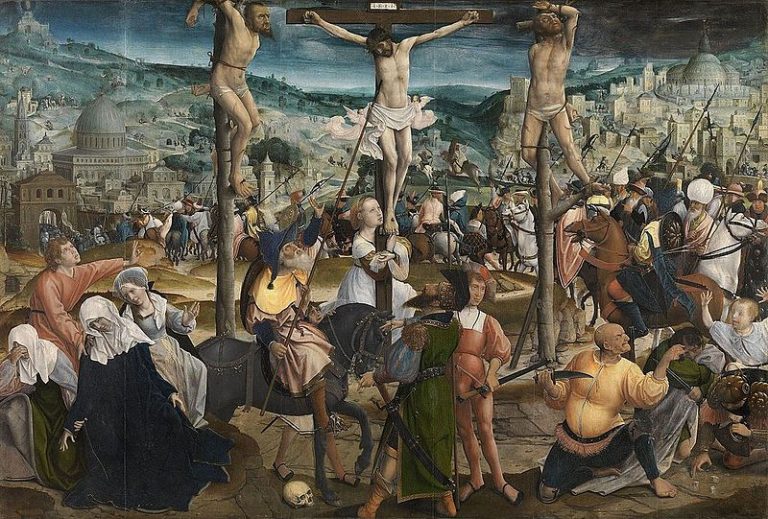The Old Testament prophesies the resurrection
In one of our previous articles we left the Lord on the Cross. In this one, we will approach His experiences, not through the words of the New Testament-from the experience of someone who watched Him during the Passion-but through someone who lived hundreds of years ago and yet the grace of God revealed them to him.
Described by Isaiah: “Many have been surprised at him, because his appearance was so distorted, he was not attractive, nor handsome enough to be noticed, nor was his presence such that we could love him. He was despised by people and forsaken, a man laden with sorrows, a companion of suffering, so that people turned their faces away from him. We ignored him as if he were nothing, gave him our contempt and esteem not a drop “. And furthermore: “They made his grave among the wicked, his tomb near the fallen ones, and yet he had not done iniquity and deceit had not been found in his mouth“[1].
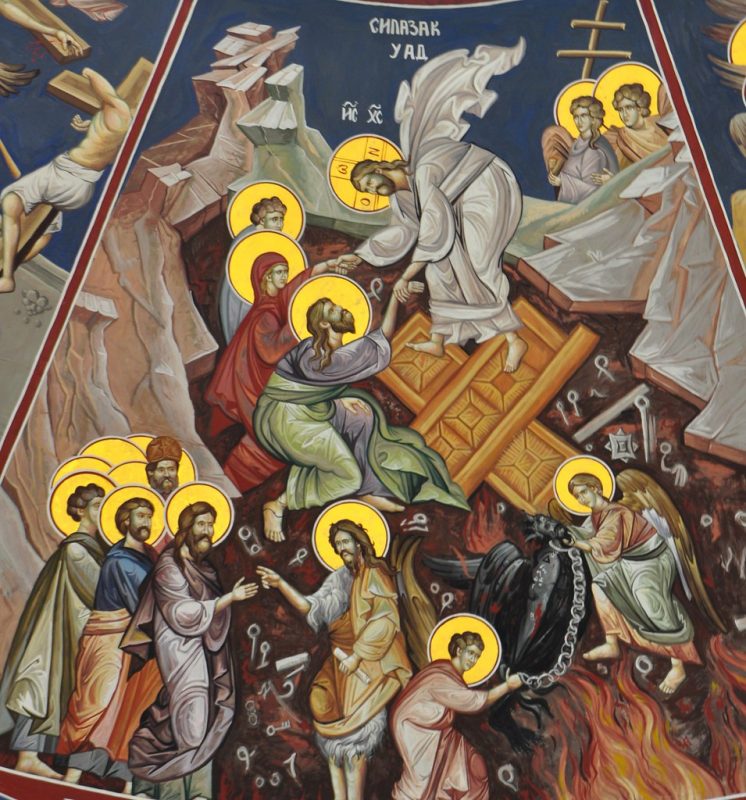
We will conclude the study of the events, then, by engaging in the two excellent chapters of the catechisms of St. Cyril with the prophecies of the Resurrection. For it is true that even if the conception, the torture, the death were still prophesied in the slightest detail, and were all carried out without the Resurrection, there would still be miraculous events, but not salvific, as they are now for the world. Aptly pointed out by the sublime Paul: “If Christ be not revealed, then is the preaching of us void, and our faith also void” (1 Cor. 15:14) and more: “But if Christ does not come, your faith is vain, for you are in your sins” (1 Cor. 15,17). Translated, “But if Christ is not risen, then our preaching is empty and without content, your faith is hollow and useless” and “And if Christ is not risen, as some deceivers say, then your faith is without content and utterly useless. You are immersed in your sins.”
If in the first article it was totally unheard of and unbelievable to the Jews that the Lord, the Messiah, the mighty, glorious and all-powerful ruler of the universe, would be betrayed, would not be recognized by those who daily awaited him, studied the divine scriptures and contemplated his coming, if it were inconceivable to them that they themselves should be responsible for his death sentence, and even by a death insulting by a death cursed by crucifixion, so inconceivable stands in the minds of the Greeks – or of the heathen in general – the resurrection of a man, the victory of death. It is well known that when the Apostle Paul preached to the Athenians Christ dead and risen, saying: “for he hath set a day in which he will judge the world in righteousness, in a man who hath ripened, having faith by raising him from the dead” (Acts 17:31), they – as Luke informs us – “hearing the resurrection of the dead, some mocked, and others said, hear thou again concerning this” (Acts 17:32).
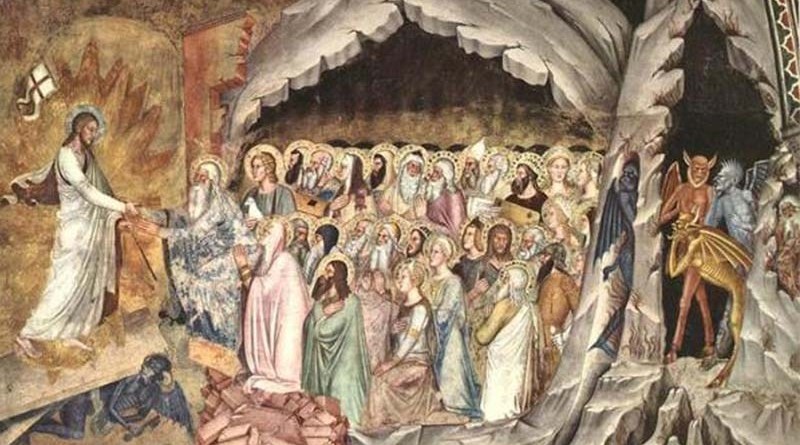
Let’s focus now on our topic: “the Old Testament prophecies about the resurrection and the events surrounding it” or “The prophecies about the resurrection, a missionary paraphernalia“.
The psalmist says : “I am risen from the suffering of the poor and the groaning of the mourners, says the Lord”. “Because of the suffering of the poor and the groaning of the bereaved I will now rise again, saith the Lord” (Psalm 11.16), as well as “Thou wilt not forsake my soul in Hades, nor wilt thou allow him who is devoted to thee to experience death” (Psalm 15.10). Commenting on the above psalm, St. Cyril of Jerusalem points out, “He did not say, nor will you allow him who is devoted to you to die, for then he would not die, but decay of course and decay I do not see them, as for death I will not remain long under its power “[2]. And asks St. Cyril: “What is this that has happened to you, Lord? Have you been spared from your enemies or have you been spared from future punishments?”[3]. The psalm itself clearly reveals what happened, or rather, what was to happen. “Lord, you have brought my soul out of Hades” (Psalm 29:4), i.e., “Lord, you have brought my soul out of Hades” (Psalm 29:4), and the psalmist goes on to prophesy, “You have saved me from the dead who descend into the grave” (Psalm 29:4).
What do the psalms and prophecies reveal about the time of the resurrection? Will it be morning, noon or evening? We focus on the sixth verse of the 29th Psalm: “In the evening you shall weep, and in the morning rejoice.” “In the evening shall weeping lodge with you, and in the morning shall come rejoicing.” And indeed, late evening the disciples had mourning, and in the morning came the Joy of the Resurrection.
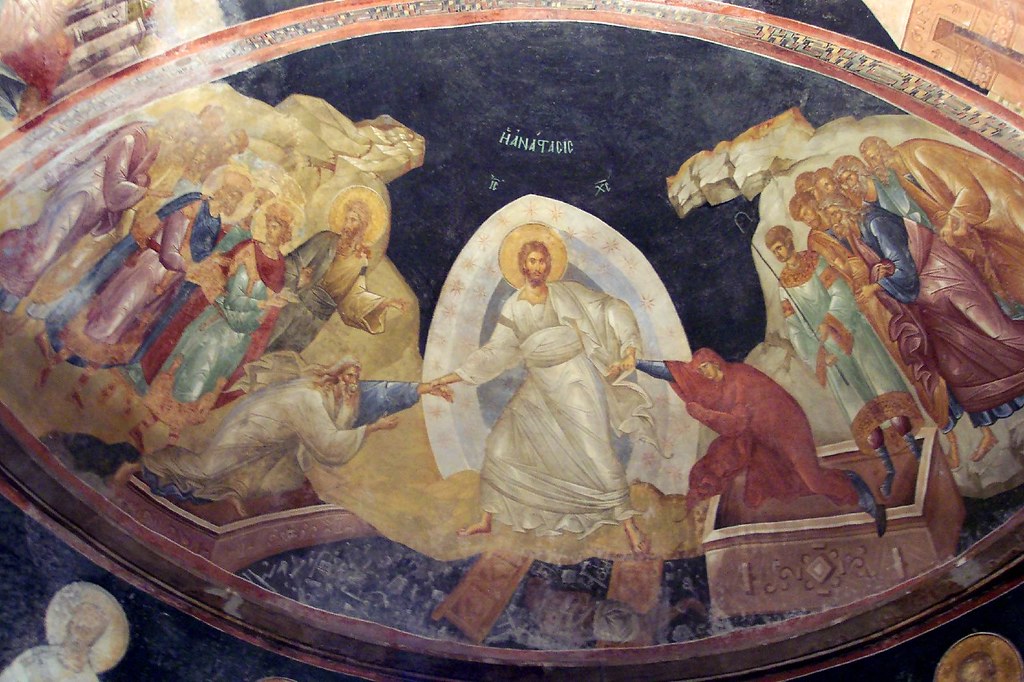
Let’s look at the place. It mentions the Song of Songs, “I descended into a garden of walnut trees” and “Garden enclosed, spring sealed”. And St. Cyril emphasizes that indeed there was a garden where Jesus was buried[4] and even that His tomb was sealed; by whom? By the Jews, as the Gospel informs us: “We remembered,” he says, “that that plan, while he was still alive, said that after three days I would rise again. Give therefore command that the tomb be made secure” And further on, “and they went and made the tomb secure, that is, they sealed the tombstone and set a guard (Matt. 27:66).
At this point, I would like to make a parenthesis and draw a parallel between the guard that guarded the tomb of Jesus and today’s Israeli police that controls the patriarch of Jerusalem just before he brings out the Holy Light. The Holy Light is a testimony of the Resurrection and it certainly lights up every time. Let us consider; if it did not light, then this state and its agencies would directly reveal it. If it were not true, the heretics would also seek to enter the tomb of Jesus to bring out the Holy Light. This, however, is only revealed to the Orthodox Patriarch of Jerusalem as proof of the uniqueness, holiness and catholicity of our Holy Church.
So we are at the place where the cortege of soldiers is guarding the tomb of Jesus. The prophet Zephaniah writes to the disciples on behalf of Christ: “Get ready, wake up early in the morning, for all their tributaries have been destroyed” (Zephaniah 3:7), that is, the soldiers of the Jews and the Romans. Destroyed was the custody, the guard of the tomb of the Risen Christ, the people whose presence at the tomb is another evidence of the Resurrection of Christ. Is it possible that they all fell asleep together? And they didn’t even hear the tomb stone that the disciples were moving to steal Jesus? If the disciples came while the soldiers were awake, was there no battle? Didn’t they wound or kill any disciples? Were they not wounded by anyone? How did they steal Jesus’ body? Was there any secret way out of the tomb other than the heavy stone that was at the door of the tomb? Of course not, because after the resurrection they checked the tomb thoroughly. If anything was found, they would have made it so public that the rumor of the Resurrection would cease.
The fact that Jesus was resurrected is clearly shown by yet another instance. The soldiers went to the Jews and said that Jesus had been resurrected and the Jews promised them money, as long as they claimed that Jesus’ body was stolen by his disciples. In this particular case they should all have been executed for dereliction of duty. They, however, not only were not executed but instead enjoyed the fruits of their redemption by the Jews. Does the aforementioned deception also prophesy? Certainly! From the prophet Isaiah, who notes: “but you tell us and announce to us another deception”; translated: “but you tell us and urge us to deceive the people once more” (Is. 39:10).
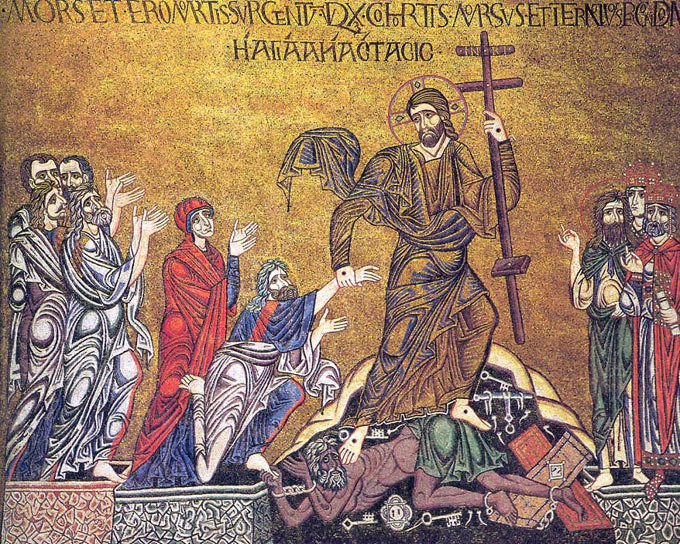
Let us also read carefully the eighty-seventh psalm, where Jesus says with the mouth of the psalmist, “Lord, you who are the God of my salvation, I cry out to you by day and by night” (87:2). This is the prophecy of Jesus’ prayer on the Mount of Mercy, in which he was broken-hearted and addressed God the Father. After two verses the psalmist emphasizes: ‘I was born as a helpless man among the dead, free'(87,5) ‘I became as a helpless man, free among the dead’. “He did not say, I became a helpless man, but “as a helpless man,” because he was crucified, not from weakness, but willingly. And His death did not result from His voluntary illness; ‘I am numbered with those who go down to the grave’ (87:5)”[5]. And then follows a blatant prophecy: ‘Thou hast removed my acquaintances from me’ (87,9). He means His disciples who all of them – except John who was under the cross – had forsaken Him.
Let us also take a look – always according to the wise guidance of St. Cyril – at the time when Christ was resurrected and whether this is prophesied by the Old Testament. In the Book of Songs it is said, “The winter is past, the rain has passed and gone, the flowers have made their appearance on the earth, the time of pruning has come” (Song 2:4). Is not the earth full of flowers and they are pruning the vines? You see how clearly the Song of Songs said that winter has passed; that Christ was resurrected in April. This is the season and the first month for the Jews, in which the Passover is celebrated, which in the Old Testament was symbolic, formal, whereas now it is real.”[6].
Remarkable is the fact that even the aromas of myrrh and the mixture of myrrh and aloe offered by Nicodemus to the buried Lord are foretold. Again the Song of Songs informs us, “I have sprinkled my myrrh with my spices” and “myrrh and aloes with all the first spices” (Song 4:14).
Furthermore, according to the Gospel, Mary went to the tomb looking for Jesus, and she did not find Him. Then she heard from the angels the joyful message and then saw Him with her own eyes. I wonder if these are also written? We read in the Song of Songs : “I sought in my bed the one whom my soul loved” (Song 3:1). For what hour of the day is spoken of? “I sought in my bed by night, him whom my soul loved” (Song 3:1). The Gospel of John assures us that Mary “went while it was still dark” (John 20:1). And the Song of Songs continues: “while I was in my bed I sought him in the nights and found him not”. And verifies John in his Gospel: “they have tasted my Lord, and I saw not who tasted him” .
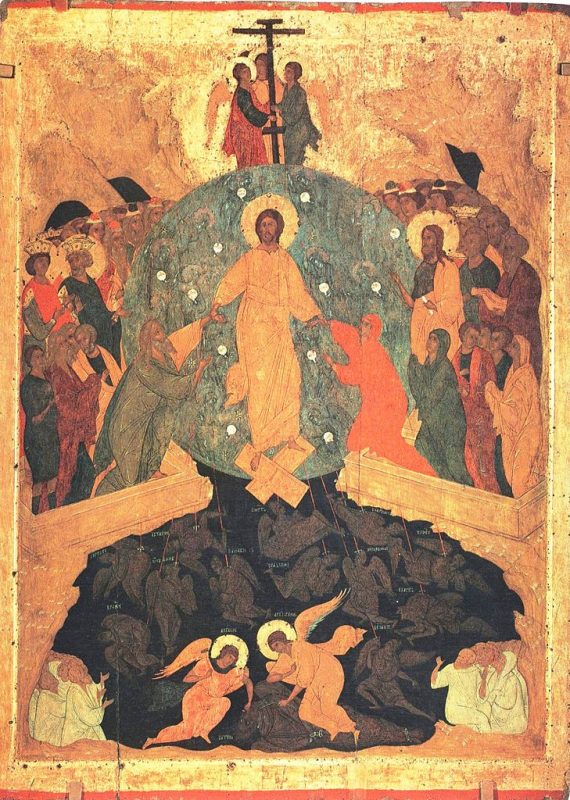
The same book repeatedly foreshadows Mary’s attitude and her meeting with the Master: “have you seen him whom my soul loved? But as soon as I turned away a little from them (that is, from the angels) I found him whom my soul loved, I held him and did not let him go” (Song 3:3-4). Indeed, after the vision of the angels, Jesus appeared alone; “and behold, he met them, saying ‘Hail’ and they came near and held his feet” (Mt 28:5-9). They held him in order to fulfill the “I held him and did not let him go” (Song 3:4).
St. Cyril continues to quote testimonies of the resurrection from God’s chosen people of the Old Testament, writing: “Those who hid the truth were buried, while those who accepted it lived by the power of the Savior, who not only raised himself from the dead, but raised with him other dead, whom the prophet Hosea writes representing: “you will heal us in two days, and on the third day we shall rise, and live with you” (Hosea 6:2)”[7]. Also, the Bishop of Jerusalem is testing the Jews who are not convinced by the Scriptures and question the resurrection of Jesus by saying: “Why, while you say that Elisha and Elijah raised the dead, do you object to the resurrection of our Savior? Because supposedly we do not now have surviving witnesses of the events of which we speak? Bring us then and you witnesses to the events that took place then. You will say, of course, that it is written there, and what we claim is written. Why then do you accept the one and disapprove of the other? Jews wrote those, and the Apostles were all Jews. So why don’t you believe your own? Paul, the preacher to the Gentiles was a Jew from Jews, and the twelve Apostles also came from Jews. Then fifteen Jerusalem bishops, who were Jews, served successively as bishops of Jerusalem. So why is it that you admit yours, while you condemn ours, even though they are also written by the Jews, your own?”[8].
On the same grounds of unbelief and disbelief many of the Jews claim that the dead raised by Elijah had just died, while Jesus stayed three days in the tomb. On this St. Cyril quotes them a beautiful parallel between Jonah and Jesus. He says: “the testimony which you ask for is given to us by the Lord Jesus himself in the Gospels, saying, ‘As Jonah was in the belly of the whale three days and three nights, so shall the Son of Man remain in the bowels of the earth three days and three nights'” (Mt 12:40).
But as we examined this narrative of Jonah, we found that it bears a strong resemblance to Jesus. Jesus was sent to preach repentance and so was Jonah, but he went away not knowing what would happen, whereas Jesus came willingly for our repentance and our salvation. Jonah slept on the ship and snored, while the sea was rough. And while Jesus slept, by divine providence the sea was stormed, that the power of him who slept might afterwards be known. Jonah was told, “Why do you snore? Arise and call upon thy God, that God may save us,” while to the Despot they said, “Lord, save us. There they said, “invoke your God” and here “save us”. But Jonah says, “Take me and cast me into the sea, and the tempest shall cease, while he, that is, Christ, rebuked the winds and the sea, “and there was great peace.” And Jonah was thrown into the belly of a whale, while Jesus willingly went down to Hades, so that death might vomit up those who had been swallowed up, according to what is written by Hosea “I will deliver them from the hands of Hades and redeem them from death” (Hosea 13:14).”[9].
It is also worth mentioning another prophecy which relates to the appearances of Jesus. “After the resurrection Jesus appeared before His disciples through the closed doors, but they doubted that it was Him, thinking they were seeing a ghost. But He urged them: “feel me and you will see, put your fingers into the marks left by the nails, as Thomas asked to do. And while they still for their joy could not believe and marveled, he asked them, “Have you anything to eat here?” They offered him a piece of roasted fish and honeycomb of honeycomb.” And all this to fulfill the passage in the Song of Songs that states “I have eaten my bread and my honey ” (Song 5:1)” [10]. How awesome! It is predicted that the Lord after His Resurrection will eat honey from a beehive!!
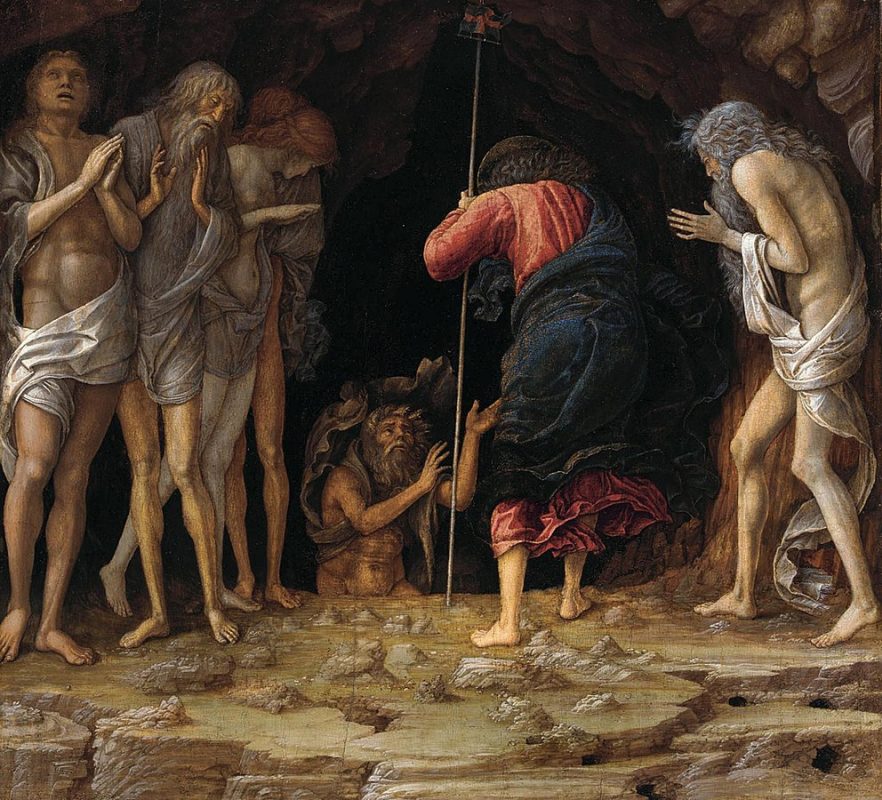
In closing, we quote the prophet Sophonia’s saying, “For then I will change the tongues of the peoples” (Wis 3:9). So it was after the Resurrection. With the descent of the Holy Spirit, the gift of tongues was given “for the purpose of serving the Lord under one yoke according to Zephaniah.” On the day of Pentecost, although people of different nationalities and therefore different dialects and languages were there in the upper room, and while Peter spoke in only one language, they all understood, for according to the prophet the languages of the peoples were changed.
In summary, Saint Cyril Archbishop of Jerusalem presents us with a clear and instructive multitude of prophecies concerning the events of the Resurrection and thus demonstrates that the predictions of the prophets and the books of the Old Testament in general are fulfilled in the person of Jesus, documenting the complete identity and harmony of the Old and New Testaments, but also the divinity of Jesus through the great sign-miracle of prophecy. This miracle is what we too ought to be making known, both in the context of internal and external missionary work, and to use it as a tool of Orthodox witness to the nations.
Deeply touched, having completed the last article of the missionary synaxis on the hospitable website of our brotherhood on which 60 articles of missionary content (one every month) have been posted in the last five years, I would like to express my warm thanks especially to the Holy God for His strength and forbearance throughout this effort. Then, I owe deep gratitude to the initiator of this project, my advisor and co-sponsor Mr. Angelos Vogiatzis – for many years a member of the board of directors of our brotherhood -, to my educational partner Rodoniki for the decisive corrections of the texts, to the philologist Mr. Iliadis Christodoulos for the philological editing of the articles, but also to our fraternity’s collaborator Mr. Kintsakis Georgios for the posting of the texts on the website, the finding of suitable images and their elegant presentation.
Christ is risen!
[1] Ioel Giannakopoulos, The Old Testament, “Lydia”, vol. 6, Thessaloniki 1986, pp. 373-376.
[2] Cyril of Jerusalem, Catechisms, “To Byzantion”, vol. 2, Thessaloniki 1994, p. 77.
[3] Cyril of Jerusalem, Catechisms, “To Byzantion”, vol. 2, Thessaloniki 1994, p. 77.
[4] Cyril of Jerusalem, Catechisms, “To Byzantion”, vol. 2, Thessaloniki 1994, p. 79.
[5] Cyril of Jerusalem, Catechisms, “To Byzantion”, vol. 2, Thessaloniki 1994, p. 83.
[6] Cyril of Jerusalem, Catechisms, “To Byzantion”, vol. 2, Thessaloniki 1994, p. 85.
[7] Cyril of Jerusalem, Catechisms, “To Byzantion”, vol. 2, Thessaloniki 1994, p. 93.
[8] Cyril of Jerusalem, Catechisms, “To Byzantion”, vol. 2, Thessaloniki 1994, p. 93.
[9] Cyril of Jerusalem, Catechisms, “To Byzantion”, vol. 2, Thessaloniki 1994, pp. 95-97.
[10] Cyril of Jerusalem, Catechisms, “To Byzantium”, vol. 2, Thessaloniki 1994, p. 87.

